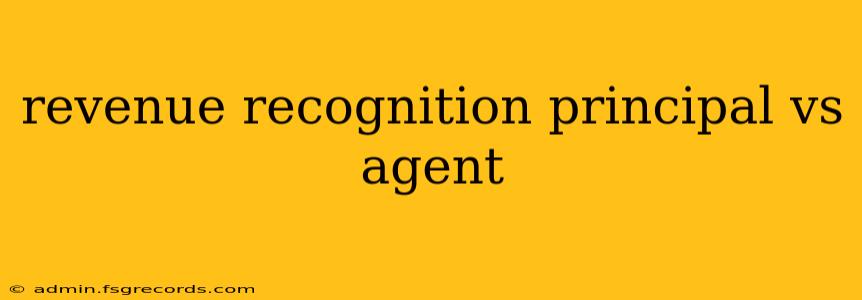Understanding the difference between a principal and an agent in revenue recognition is crucial for accurate financial reporting. This distinction significantly impacts how a company accounts for its revenue, particularly in complex transactions involving intermediaries. This guide will delve into the core differences, providing a clear explanation of the accounting implications for each role.
What is Revenue Recognition?
Before diving into the principal vs. agent debate, let's briefly define revenue recognition. Revenue recognition is the process of recording revenue in accordance with generally accepted accounting principles (GAAP) or International Financial Reporting Standards (IFRS). The core principle is to recognize revenue when it is earned and realized or realizable. This means the company has substantially completed its performance obligations and is reasonably certain of receiving payment.
Principal vs. Agent: Defining the Roles
The key to understanding revenue recognition in these scenarios lies in identifying whether the entity acting as an intermediary is acting as a principal or an agent.
The Principal
A principal is a party that controls the goods or services being provided to the customer. The principal bears the risks and rewards associated with the transaction. They are ultimately responsible for fulfilling the performance obligations to the customer. Think of a manufacturer selling its products directly to a retailer—the manufacturer is the principal. Key characteristics include:
- Control over goods or services: The principal has control over the goods or services being provided to the customer.
- Inventory risk: The principal bears the risk of unsold inventory.
- Pricing power: The principal sets the price for the goods or services.
- Profit margin: The principal earns a profit margin on the transaction.
The Agent
An agent, on the other hand, acts on behalf of the principal. The agent facilitates the transaction between the principal and the customer but does not take ownership of the goods or services. They earn a commission or fee for their services. An example is a real estate agent selling a property on behalf of the homeowner—the homeowner is the principal, and the agent facilitates the sale. Key characteristics include:
- No control over goods or services: The agent does not control the goods or services.
- No inventory risk: The agent does not bear the risk of unsold inventory.
- Limited pricing power: The agent typically does not set the price.
- Commission-based income: The agent's income is based on a commission or fee.
Revenue Recognition Implications: Principal vs. Agent
The roles of principal and agent directly impact how revenue is recognized:
Revenue Recognition for a Principal
When acting as a principal, a company recognizes revenue when it satisfies its performance obligations to the customer. This typically involves the transfer of goods or services to the customer. The amount of revenue recognized is the selling price agreed upon with the customer.
Revenue Recognition for an Agent
When acting as an agent, a company recognizes revenue only as a commission or fee earned for facilitating the transaction. The revenue is recognized when the agent has completed its performance obligation—typically when the principal has delivered the goods or services to the customer and the agent has earned its commission. The amount of revenue recognized is the commission or fee earned, not the total transaction value.
Practical Examples
Let's illustrate with practical examples:
Example 1: E-commerce Platform
An e-commerce platform facilitating sales between buyers and sellers. If the platform takes ownership of the goods and sets prices, it's acting as a principal and recognizes revenue on the sale price. If it simply acts as a facilitator and charges a commission, it's acting as an agent and recognizes revenue only on the commission.
Example 2: Travel Agency
A travel agency booking flights for customers. If the agency takes possession of the tickets and resells them at a markup, it’s acting as a principal. If it simply acts as an intermediary, receiving a commission from the airline, it's acting as an agent.
Conclusion
Accurately determining whether a company is acting as a principal or an agent is crucial for correct revenue recognition. The distinction impacts the timing and amount of revenue recognized, directly affecting a company's financial statements. A thorough understanding of the characteristics of each role is essential for proper accounting practices and ensuring compliance with relevant accounting standards. This comprehensive guide provides a foundational understanding, but consulting with an accounting professional is always advisable for specific situations.

